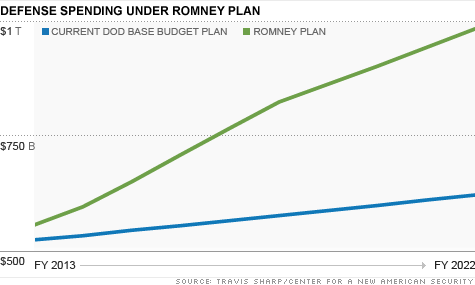Fiscal Conservativism? Romney Would Raise Defense Spending $2.1 Trillion Over 10 Years
Mitt Romney is proposing one of the biggest peacetime increases in military spending in U.S. history.
Mitt Romney likes to talk about fiscal responsibility, but there’s one area of Federal spending that he would increase by a rather astronomical amount:
NEW YORK (CNNMoney) — Mitt Romney is campaigning on a platform that emphasizes less spending, smaller deficits and renewed fiscal responsibility.
But in one budget area, Romney is running the opposite direction. The former Massachusetts governor wants to increase defense spending by leaps and bounds. By one estimate, additional spending would exceed $2 trillion over the next decade.
Romney’s plan calls for linking the Pentagon’s base budget to Gross Domestic Product, and allowing the military to spend at least $4 dollars out of every $100 the American economy produces.
With the Pentagon’s base budget — which does not include war costs — forecast to hit 3.5% of GDP in 2013, a jump to 4% would mean an increase of around $100 billion dollars in defense spending in 2013.
The additional spending really piles up in future years.
Compared to the Pentagon’s current budget, Romney’s plan would lead to $2.1 trillion in additional spending over the next ten years, according to an analysis conducted for CNNMoney by Travis Sharp, a budget expert at the Center for a New American Security.
And that number assumes a gradual increase to 4% of GDP. The additional spending would hit $2.3 trillion over a decade if the Pentagon’s budget were to immediately jump to 4% of GDP.
Sharp said the United States could certainly ramp up spending to meet Romney’s target. But the bigger question, he said, is whether the investment would be worth the cost.
“Romney’s plan might reduce military risk in some areas,” Sharp said. “But you can never eliminate all the risk — no matter how much you spend.”
Indeed as we have noted here at OTB several times in recent years, the United States dwarfs the military spending of every other country in the world, including any of those that could be called actual or potential threats to our national interests, by wide, wide amounts. Consider, for example, this chart from Wikipedia showing 2011 military spending by the top 20 countries in the world:
As this chart shows, the United States’s military spending (which includes both the Pentagon base spending that Romney would increase and war-related spending) accounts for 44.43% of all the military spending in the world. If you add in the military budgets of the NATO and non-NATO allies in the Top 20, it amounts to more than 70% of the worldwide military spending, dwarfing the spending of nations like China, Russia, and Iran to a considerable degree. Based on sheer numbers alone, the idea that the United States isn’t spending enough on defense, a refrain one hears frequently from the hawkish wing of the GOP, is quite simply absurd. Even if Russia an China tripled their combined military spending, they still wouldn’t equal what we spend on our one, and they’d be nowhere near what the U.S. and its allies spend. As for Iran, their military budget in 2011 was roughly $7,000,000,000 in 2008 and most likely hasn’t increased very much since then, that amounts to .01% of what the United States spent in 2011 and roughly half of what Israel spent in 2008. As James Joyner noted when he looked at this issue earlier this year, the United States and its alies absolutely dwarf any potential foe when it comes to military spending, at the very least I’d suggest that this means that the constant Republican argument that we must increase defense spending in the face of a dangerous world is essentially bunk.
The most notable thing about Mitt Romney’s plan to increase defense spending, though, is that it makes the rest of his fiscal programs largely untenable. There’s simply no way, politically or mathematically, that the Federal Budget can be brought under control without including defense spending in the mix. The end of the wars in Afghanistan and Iraq was supposed to actually help in that regard since it would take as much as $1 trillion off the table, and indeed both Republican and Obama Administration budget plans assume that this savings will occur. Romney’s proposal would completely wipe that out, thus bringing his entire commitment to fiscal conservatism into question:
Romney’s plan to spend more at the Pentagon adds yet another layer of complexity to a set of proposals that would remake the fiscal landscape.
Romney has proposed a slew of tax cuts, and plans to cap federal spending at 20% of GDP. But in both cases, the Romney campaign hasn’t fully explained how those provisions will be paid for.
The lack of detail means that Romney’s claim of moving toward a balanced budget requires a great deal of trust.
“Romney has listed a few specific cuts he would make in discretionary spending, but they are a fraction of the extra defense spending he proposes,” said Jeffrey Vanke, a senior policy analyst at the Committee for a Responsible Federal Budget.
Other budget experts expressed similar concerns about Romney’s proposal, including Peter Singer, a senior fellow at the Brookings Institution, who said the plan for additional spending does not “reflect fiscal reality.”
To get an idea of just how much of a radical increase in defense spending, here’s a chart showing the difference between Romney’s proposal and current baseline assumptions on defense spending:
 That’s a heck of an increase in spending, and one wonders where Romney thinks he’s going to get the money for it. Taxes increases are already off the table apparently, so that means either massive decreases in non-defense discretionary spending and entitlements or larger budget deficits. The problem with that, of course, is that there isn’t a whole lot of room for significant cuts in non-defense discretionary spending; even eliminating entire Cabinet departments wouldn’t result in the kind of savings that would be needed to make up for Romney’s massive military buildup. As for entitlements, the political will for the kind of cuts that would be needed simply isn’t there on either side of the aisle. That means, then, that Romney would end up having to repudiate his supposed claim to fiscal responsibility and continue running up massive deficits far into the future, or he’d have to abandon his military buildup. Which do you think would happen?
That’s a heck of an increase in spending, and one wonders where Romney thinks he’s going to get the money for it. Taxes increases are already off the table apparently, so that means either massive decreases in non-defense discretionary spending and entitlements or larger budget deficits. The problem with that, of course, is that there isn’t a whole lot of room for significant cuts in non-defense discretionary spending; even eliminating entire Cabinet departments wouldn’t result in the kind of savings that would be needed to make up for Romney’s massive military buildup. As for entitlements, the political will for the kind of cuts that would be needed simply isn’t there on either side of the aisle. That means, then, that Romney would end up having to repudiate his supposed claim to fiscal responsibility and continue running up massive deficits far into the future, or he’d have to abandon his military buildup. Which do you think would happen?
On a final note, I have to say that there doesn’t seem to be any logic in tying future defense spending to a percentage of GDP. For one thing, 4% is an entirely arbitrary number that has nothing to do with actual defense needs or economic logic. The fact that we’re spending a certain percentage of our GDP on defense doesn’t mean that it’s being spent wisely, or that we’re spending what we need to. It’s possible that, in some situations, 4% of GDP in a given year might be too little, while in most years it’s likely to be far, far too much. Moreover, GDP itself is a figure that moves for reasons entirely unrelated to the nation’s security needs, so it makes absolutely no sense to tie defense spending to it. And what happens in a recession when GDP falls, does that mean we’d have to cut defense spending? Does anyone actually believe that would happen?
Defense spending is no a sacred cow. There’s no reason it should not be on the table when we talk about getting the nation’s fiscal house in order, and there’s certainly no rational reason it needs to be increased by $2 trillion dollars over the next decade. As is usually the case with Republicans, Mitt Romney commitment to fiscal conservatism turns out to be a chimera once you actually look at the details








Conservatives are not serious about the deficit, however they are very serious about their ideology. Right now, tax cuts and beginning legislative efforts to actually cut social program spending – Medicaid, Pell Grants, shift Medicare expenses to retirees – are more important than deficit reduction.
Obama gambled that stimulus spending would prevent the economy from a descent into a Depression, and would buy us time until the economy generated sufficient growth to eliminate the deficit.
Republicans, on the other hand, see this as the perfect time to cut both taxes and social programs, that is, they are quite willing to create wider deficits to get that accomplished.
Do the American people really want this? We’ll see.
Let’s see:
1) cut taxes on the rich, check.
2) cut benefits to the poor, check.
3) expand military spending, check.
Pfft. It’s a comic book stereotype playing out before our eyes.
I doubt that’s an accurate reflection of what many countries are spending, even China, which uses slave labor for much of their manufacturing.
@Jsmith:
China does not use slave major for much, meaning a majority, of its manufacturing. As I understand it, there are some prison programs, but their incarceration rate is actually lower than ours, isn’t it?
Now, they do have a low labor cost, which does allow them to stretch their dollar. In the past that didn’t matter too much, because their output was low tech crap. Now that they are moving high tech, that will give them a greater ability to produce tech weaponry, it is true.
ya think?
Republicans are fiscal frauds.
And there is absolutely no reason to think that is going to change if Mr. Etch-a-Sketch is elected.
Off the table? The Romney/Ryan plan calls for ADDITIONAL tax cuts.
Look — this guy was born into someone else’s wealth and, given that huge stroke of luck, managed to make a bunch more money investing someone else’s wealth.
Does that qualify him as a brilliant businessman? Who knows?
I do know that when you consider the utter ridiculousness of his claims of small deficits and fiscal responsibility in the face of huge tax cuts and massive defense spending, together with his claims that the economy should be creating 500K jobs a month and UE should be at 4%…it’s clear he does not possess the economic knowledge that would qualify him to be President. And that is supposed to be his strong suit — it really is his only selling point.
If your only selling point is dubious at it’s core…well then…your very candidacy is dubious at it’s core.
Well…he does have another selling point….that he’s not Obama. And that is verifiably true. He is not Obama.
BLOCKQUOTE failure strikes again.
Who do I bribe to get an edit button?
@PJ: PREVIEW is your friend
@PJ:
Scratch that.
I reversed those numbers.
Number of prisoners:
US: 2.29 million
China: 1.63 million
Now, according to the ICPS there are another 650,000 held in detention centers, which would make China’s incarceration rate 1.70 and the total 2.3 million.
@Scott O.:
So true.
But I forget 🙂
Fiscal Conservative: A person who believes that tax cuts cure all economic ills, “social programs” cost too much and that “defense” spending is always too low.
This is not to be confused with someone who is fiscally responsible.
I’m not as fixated as I once was on reigning in deficits and the debt, basically because of the ’08 crash and its aftermath. Unemployment is a bigger problem than the debt, for now, IMO. Even some of which that goes to the military. My issue is with the priorities. I’d rather spend on building infrastructure or aid to states for teachers or something I think provides more value to our society than, say, more F-35s.
The GOP’s priorities are totally wack.
Mitt wisely sees the growing threat of the Soviet Union in Europe……….
Sounds like Romney is producing the expected electoral pandering pie in the sky numbers. Surely more to come.
It’s clear that Mitt knows who he would be working for.
That’s insane. For the precise reasons mentioned in the main blog post.
Were I made emperor with plenary powers I would in the aggregate slash DOD spending. There are a lot of unnecessary weapons programs out there. I also would focus DOD spending on our drone programs, on air superiority fighters, and on tactical naval power, e.g., attack submarines, fast landing crafts and guided missile cruisers. The Fulda gap no longer is relevant. There won’t ever be another Operation Citadel.
Selectively trimming the fat is the hobglobin of fiscal irresponsibility. DOD must be on the chopping block.
Greetings:
“Peacetime” ??? Did you actually keystroke “peacetime” ??? Really ???
Hello !!!
Remember, it’s the GOP that claims that unions are bribing politicians who cut checks for them and need to be stop. When will the GOP propose that defense contractors shouldn’t be able to donate to the people in Congress?
@Timothy Watson: Might want to look over the International Machinists and Aerospace Workers Union’s page on defense cuts. Not every one making book on defense wears pin stripes.
@Hey Norm:
I’m going to borrow this:
Best one line description of Romney I’ve seen.
Um we’ve been here before. 2000-2008. Two wars that did not need to be paid for because reducing taxes always increases revenues and, per Cheney, deficits don’t matter.
Conservatives only care about deficits when Dems are in power and taxes are spent on the pro-life programs (“entitlements”) they loathe instead of the punishment (ever more crimes) and killing (war)programs they believe are the only legitimate government functions.
Check out the growth of the deficit under Rep vs. Dem. Presidents.
@john personna: not just the incarceration rate, but in absolute numbers, too.
@benjoya:
I’d say that the absolute numbers are about the same.
@Scott F.: Like W, Romney was born on third base and thinks he hit a home run.
@john personna: 4% of gdp is historically very low for military spending. Under BHO we are heading to a 200 ship navy instead of a 600 ship navy. We are going to have to rebuild just like Reagan had to after Carter and the liberals gutted the military in the late 70’s. Since Obama’s 10 year spending will be $49 trillion this level of spending is not any big deal. Obama’s policies have put us in a position for a major war and or major terrorist event to occur. He has lost us most all of north africa to the radical islamists. Iran will have the bomb soon enough. Hard to fix stupid. This stuff is going to cost us a lot of blood and treasure.
@MHC:
Name our threats, and then explain how more ships address them.
(Perhaps a nation thinking about unmanned, unlimited range, bombers needs fewer ships. Perhaps it needs to spend less GDP.)
As illustration, we have lost no sea wars since downsizing Reagan’s navy.